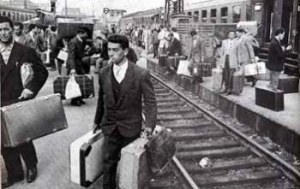He was not the only who decided to leave this country. During the 70´s a massive amount of people from Andalucia decided to emigrate as a consequence of the economic crisis that Spain was undergoing.
 In order to learn more about the topic we have chosen, we have looked up both some web sites, and a book named "Cultura Andaluza."
In order to learn more about the topic we have chosen, we have looked up both some web sites, and a book named "Cultura Andaluza."
If the event that we would find some more data could be used looking up some other sources such as news, documentaries ... We will add it later on.
During Franco´s dictatorship, an autarkic economy totalitarism was promoted, based Andalusian's agriculture. A desindustrialization as going on so only a small percentage (18,96%) of the Spanish society was devoted to the secondary economic sector in 1960 and this is the reason why the backwardness of this area was consolidated. This huge underdevelopment caused the need of the population to emigrate to other countries. This is reflected by the poet Rafael Alberti in his songs of John Baker:
"Este es el pueblo andaluz,
Serio, puro y desgarrado,
En las tierras de la luz.
Tristes pájaros que van
Bajo los soles quemados,
Sin sueño, en busca de pan.
Que van más lejos, a fuera,
Dejando el hogar en llanto,
Solos, a tierra extranjera."
At the middle 50´s it was clear enough that Franco´s autarkic system of Franco had failed, taking as a reference that huge crisis that was taking place in Spain and which made the improvement completely impossible. In 1957 the Government promoted a Stabilization Plan, from this movement, starts a period of "development" which would make an improvement on the socio-economic structures with respect to the previous periods. With regards to Andalucía the economic changes affected the promotion of the region as a tourist destination and this was as a result of the Development Plans which promoted some sort of industrialization. Although during those years,the economic crisis was cut down, in 1975 a massive amount of people continued emigrating from Andalucia.
France, Germany and Switzerland were the places chosen by the emigrants due to the lack of manpower this place were undergoing. With regards to Spain, almost all these years of emigration people went to these three countries, and the regions from which most emigrants departed because of their rural socio-economic backwardness in those moments where, specifically, Andalucia, Castilla-La Mancha and Extremadura.


